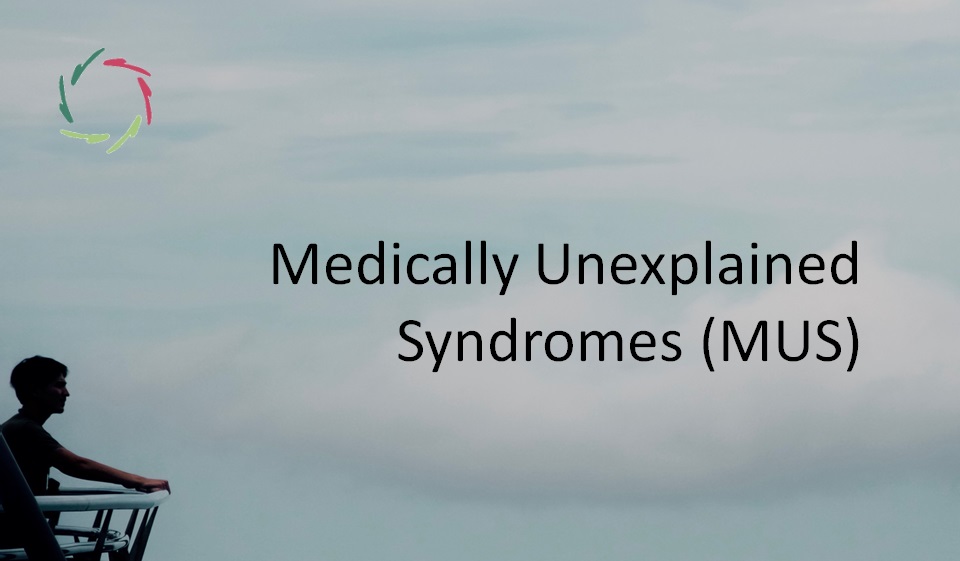Medically Unexplained Syndromes (MUS)

Being very common, MUS-patients need recognition of their suffering, a good relationship with their physicians and others, a sense of control and a proper action plan. Needed foremost towards this is a realistic understanding of mind=body wholeness.
[This text is the result of a small literature research by me in top medical journals. This is therefore not purely my personal opinion. You find the references of some articles below.]
Definition
MUS refer to “persistent bodily complaints for which adequate examination (including investigation) does not reveal sufficiently explanatory structural or other specified pathology.” [1]
Many names
Over the years, many terms for about the same clustering of symptoms have been coined: psychosomatic syndromes, psychophysiological disorders, conversion disorders, somatoform disorders, bodily distress disorders, functional somatic syndromes, and medically unexplained syndromes (MUS). The lack of consensus on a single name stems from an imperfect causal understanding as well as the attached stigma. ‘MUS’ has the advantage of clearly highlighting the common point. However, this term carries the disadvantage of presenting the disease as a diagnostic failure, which can generate anxiety for the patient and a feeling of helplessness for his doctor.
Many categories or one?
MUS are split into a number of more specific diagnostic categories. Most medical specialties seem to have at least one unexplained syndrome. A few examples: irritable bowel syndrome (gastroenterology), chronic widespread pain and fibromyalgia (rheumatology), temporomandibular joint dysfunction and atypical facial pain (dentistry), chronic fatigue (infectious diseases), premenstrual syndrome (gynecology), globus syndrome (ORL), multiple chemical sensitivity (environmental health), psychogenic non-epileptic seizures and whiplash (neurology), and non-cardiac chest pain (cardiology). All these are common in primary care.
Because symptoms, epidemiology, and response to treatment overlap, many researchers suggest that they may be one entity [2]. Several studies have shown overlaps between the syndromes. Many patients with irritable bowel syndrome, for example, meet the criteria for fibromyalgia, and vice versa. In general the etiological factors for MUPS are similar to those for anxiety and depression. Heightened bodily sensitivity is a feature in many patients with irritable bowel syndrome, fibromyalgia, and chronic fatigue syndrome.
Frequent and costly
Most physicians spend much time and energy on MUS during their daily practice. It has been estimated that medically unexplained symptoms account for up to 45% of all general practice consultations, while a study based in secondary care indicated that about 50% of patients had no clear diagnosis at 3 months. [1] Many cases are very long lasting, especially when taking into account lifetime comorbidity with other MUS. Fear of neglecting a medical disease is the most frequent response to MUS.
It is also known that many people with MUS never consult.
Inappropriate referrals for investigations and specialist opinions are common, as well as the seeking of alternative therapies — which are costly for both the patient and the health service.
MUS cause far more morbidity than mortality. As a consequence, they are especially disabling and costly. If not treated properly, they can result in iatrogenic harm and large amounts of resources being wasted.
Psyche + soma
There is overwhelming evidence to show that these syndromes have psychological risk factors. [2] They are aggravated by an unfavorable socio-environmental and socio-emotional environment. At the same time, there is a lot of evidence that the symptoms are accompanied by obvious neurobiological modifications. Part of the explanation lies in the fact that a network of interacting systems has bidirectional communication with the CNS, mediating effects of psychosocial factors on the production of physical symptoms.
Patients with MUS may best be viewed as having complex adaptive systems in which cognitive and physiological processes interact with each other and with their environment. [3]
Resistance to ‘psy’
The majority of patients readily deny any psychic component while a label of “psy” is socially stigmatizing. Nevertheless, while patients resist psychological explanations, their narratives are replete with references to psychological mechanisms, conflict, and distress. At the same time, the absence of a clear diagnosis makes it harder for them to make sense of their illness, to achieve a legitimate sick role, to access support and resources, and to take action on their illness. [4]
This may even be aggravated by medical management.
The search for serious and rare diseases is endless and will gradually strengthen the patient in his rejection of a psychic and / or environmental causality, produce “incidentalomas”, false positives that it will be difficult to exonerate without prescribing other examinations, anxiety-provoking and sometimes dangerous, generating a major economic cost for the community. The patient is frequently left with a persistent state of increased health anxiety.
On top of this, patients who present to primary care practitioners with MUS are often treated for their presenting syndromes while co-existing syndromes are ignored. This results in referral to hospital clinics where management is focused on finding an organic cause for these syndromes, e.g. patients with chronic orofacial pain presenting to dental clinics. [2]
And yet, when the bodily quality and cultural meanings of their suffering are acknowledged, most patients with MUS accept that stress and emotions affect their physical condition.[4]
Physician’s view
Physicians frequently have a difficult time with MUS patients. They may feel that their competence is challenged by their inability to explain the symptoms. As a result, they report less satisfaction when caring for patients with persistent MUS than for patients with clearly physical or clearly psychological problems.
By way of protection, many clinicians have developed strategies for deflecting the threat to medical competence posed by MUS. These involve shifting the blame to some characteristic of the patient, attributing it to specific psychological traits or states of the patient. This gives meaning to distress, locates responsibility within the system of medical specialization, and neutralizes the threat to professionalism. [4]
In the worst case, the patient is no longer considered a patient to whom the clinician owes patience, rigor and empathy but as an individual without any somatic problem, who complains without legitimacy, to whom he has no diagnosis or treatment to propose, who is a waste of time…
Patient’s view
Patients with MUS are regularly not optimally treated by their doctors, leading to disastrous psychosocial and economic consequences. Additionally, they may feel that they are disbelieved and accused of fabricating their symptoms. From the point of view of the patient, this medical behavior is often traumatic.
Meanwhile, many patients feel intense suffering and often fear a life-threatening illness. They therefore feel all the harsher the rejection of which they are the object and of which they are fully aware.
No wonder, MUS patients tend to be vociferous about that their symptoms are “not psychiatric” and that psychological treatments such as cognitive behavior therapy have no place in treating these disorders. They are frequently aggressive and announce their lack of confidence in the medical profession. They may even disengage from health care (including for other comorbid problems).
At the positive side, MUS patients are most satisfied if their doctors give empowering, non-judgmental explanations for symptoms that make sense, legitimize the patient’s suffering, remove any blame, and generate ideas about how they could self-manage their symptoms. [5]
AURELIS
Looking at the above, I cannot help seeing in AURELIS the most appropriate answer to MUS:
- It fully encompasses mind=body wholeness.
- It brings physician and patient together in mutual, science based understanding.
- It takes away a lot of frustration for all concerned (physician, patient, direct environment…)
- It takes away guilt – which doesn’t even exist in AURELIS philosophy.
- It provides health management in which the patient can take optimal control. This is by itself health-provoking.
- It drastically diminishes healthcare costs to society and patients.
- It drastically diminishes the huge burden on physician’s time and energy.
- It makes the physician’s profession generally more agreeable.
Needless to say, I truly believe in the power of AURELIS in the domain of MUS. In view of the enormous costs to patient (illness burden, money), physician and society, according to me, AURELIS is more than a possibility in the management of MUS. It is a necessity.
References
- Chew-Graham CA1, Heyland S2, Kingstone T3, Shepherd T3, Buszewicz M4, Burroughs H5, Sumathipala A6. Medically unexplained symptoms: continuing challenges for primary care. Br J Gen Pract. 2017 Mar;67(656):106-107.
- Aggarwal VR1, McBeth J, Zakrzewska JM, Lunt M, Macfarlane GJ. The epidemiology of chronic syndromes that are frequently unexplained: do they have commonassociated factors?Int J Epidemiol. 2006 Apr;35(2):468-76.
- Burton C1. Beyond somatisation: a review of the understanding and treatment of medically unexplainedphysical symptoms (MUPS). Br J Gen Pract. 2003 Mar;53(488):231-9.
- Kirmayer LJ1, Groleau D, Looper KJ, Dao MD. Explaining medically unexplained symptoms. Can J Psychiatry. 2004 Oct;49(10):663-72.
- Hatcher S1, Arroll B. Assessment and management of medically unexplained symptoms. BMJ. 2008 May 17;336(7653):1124-8.


